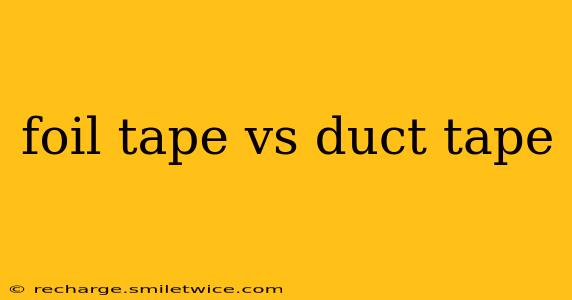Choosing between foil tape and duct tape often depends on the specific task at hand. While both are adhesive tapes used for a variety of purposes, their properties and applications differ significantly. This detailed comparison will help you understand the strengths and weaknesses of each, enabling you to make the right choice for your project.
What is Foil Tape?
Foil tape is a type of adhesive tape with a metallic foil backing, typically aluminum. This gives it unique properties compared to duct tape, making it suitable for specific applications. The foil backing provides excellent reflectivity, heat resistance, and moisture resistance. The adhesive is usually a strong pressure-sensitive adhesive designed for long-lasting adhesion.
What is Duct Tape?
Duct tape, also known as gaffers tape or just "duck tape," is a versatile cloth-backed adhesive tape. Its strength lies in its durability and ability to adhere to a wide range of surfaces, even uneven ones. The cloth backing gives it flexibility and tear resistance, making it ideal for temporary repairs and bundling. It's less precise in application than foil tape.
Foil Tape vs. Duct Tape: Key Differences
Here's a table summarizing the core differences:
| Feature | Foil Tape | Duct Tape |
|---|---|---|
| Backing | Aluminum foil | Cloth |
| Strength | Strong, but more susceptible to tearing | Very strong, highly tear-resistant |
| Flexibility | Less flexible | Very flexible |
| Heat Resistance | Excellent | Poor |
| Moisture Resistance | Excellent | Poor |
| Reflectivity | Excellent | None |
| Applications | HVAC, waterproofing, electrical work | Repairs, bundling, packaging, temporary fixes |
What are the applications of foil tape?
Foil tape's unique properties lend themselves to specific applications:
- HVAC systems: Sealing ductwork to prevent air leaks and energy loss. Its reflective properties also help minimize heat transfer.
- Waterproofing: Sealing seams in roofing, gutters, and other areas prone to water damage.
- Electrical work: Insulating wires and connections, providing a protective barrier.
- Automotive repairs: Sealing seams and repairing small holes in body panels.
- DIY crafts and repairs: Creating heat barriers or reflective surfaces in projects.
What are the applications of duct tape?
Duct tape's versatility makes it a household staple:
- Temporary repairs: Fixing tears in clothing, securing packages, and patching holes.
- Bundling: Securing wires, cables, and other items.
- Packaging: Sealing boxes and other containers.
- Emergency repairs: A quick fix for minor damage.
- Crafts: Used in various craft projects for its strength and adhesive properties.
Which tape should I use for [specific application]? (Addressing common questions)
This section directly addresses typical questions users have when choosing between foil and duct tape.
Is foil tape better than duct tape for sealing ducts?
Yes, foil tape is generally preferred for sealing HVAC ducts. Its superior heat and moisture resistance properties prevent energy loss and condensation, significantly impacting system efficiency. Duct tape's vulnerability to heat and moisture makes it a less effective and less durable choice for this application.
Can I use duct tape for waterproofing?
While duct tape can provide temporary waterproofing in emergencies, it's not a reliable long-term solution. It's susceptible to water damage and will eventually fail, leading to leaks. Foil tape is far superior for permanent waterproofing solutions.
Is duct tape good for electrical work?
No, duct tape is not recommended for electrical work. It doesn't provide adequate insulation and its adhesive can become brittle and fail over time, creating a fire hazard. Foil tape offers better insulation properties for electrical applications, though specialized electrical tape is usually the safest option.
Can I use foil tape for bundling wires?
While possible, foil tape isn't ideal for bundling wires. Its lack of flexibility compared to duct tape makes it harder to work with, and the sharp edges of the foil can damage the wires. Duct tape is the far more suitable choice for this purpose.
In conclusion, the choice between foil tape and duct tape hinges on the specific application and its requirements. Understanding their individual strengths and weaknesses ensures you select the right tool for the job, resulting in a successful and long-lasting outcome.
